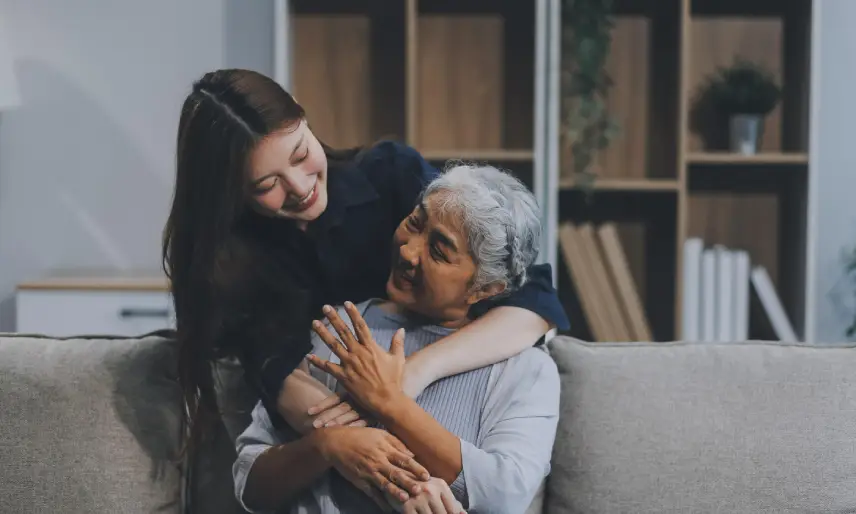
Are You Really Keeping Mom Safe by Not Letting Her Fall?
If you’ve managed to keep Mom at home—bravo. That’s an accomplishment that deserves real recognition. Supporting a loved one as they age, especially in the comfort of their own home, requires emotional strength, endless patience, and daily decision-making that walks the tightrope between care and caution.
One of the most common fears among adult children and family caregivers is this: What if she falls? That fear is understandable.
Falls are one of the leading causes of injury in older adults. However, in trying so hard to prevent the fall, we may unintentionally create something else just as dangerous—a life stripped of joy, autonomy, and purpose.
Is Caution Crowding Out Connection?
When we bubble-wrap Mom’s world to keep her safe, we often remove the very things that give her life texture and meaning. A spontaneous outing, choosing her own clothes, dancing to her favorite records—these aren’t risky behaviors. They’re expressions of identity, dignity, and spirit.
So, how do we strike a balance between physical safety and emotional well-being?
How to Support a Safer and More Meaningful Life
It starts with reframing what “safe” really means. Safety isn’t just about avoiding injuries—it’s about preserving identity, honoring preferences, and creating opportunities for joy. Here are some practical ways to help Mom thrive without unnecessary restriction:
- Let her help: Invite her to set the table, fold laundry, or pick the music for dinner.
- Encourage gentle movement: Daily walks, balance exercises, or chair yoga can reduce fall risk and lift spirits.
- Play and reminisce: Familiar card games, puzzles, or family photo albums can reignite cognitive engagement.
- Watch your words: Avoid correcting or confronting. Redirection and calm conversation go further.
- Keep music in the mix: Songs from her youth can improve mood and spark memory.
- Revisit the medication list: Talk to her doctor about whether certain prescriptions can be simplified or reduced.
- Promote healthy sleep: Keep a consistent rhythm of activity during the day to support better rest at night.
- Explore supportive care options: Palliative or hospice services can improve comfort without requiring relocation.
- Prepare for the unexpected: Have a contingency plan in place if your current caregiving setup changes.
- Add in therapy: Occupational or physical therapists can suggest exercises and adaptations that enhance both safety and autonomy.
- Use sensory comfort tools: Weighted blankets, warm lighting, or aromatherapy can soothe without side effects.
- Pay attention to moods: Sudden changes may indicate physical discomfort, not just emotional distress.
- Tailor the care: Every person’s needs—and desires—are unique. Customized care plans matter.
Signs It May Be Time to Reassess Your Care Approach
Even with the best intentions, caregiving routines can become overly restrictive without us realizing it. If you’re unsure whether your current approach is too focused on safety at the expense of quality of life, look for these signs:
- Your loved one seems withdrawn or depressed
- Daily routines feel overly rigid or monotonous
- They resist help or become agitated more often
- You feel constant pressure to “prevent” rather than “support”
- There’s little room for spontaneity, creativity, or laughter
When these red flags appear, it may be time to take a step back and reexamine your approach. A small shift—like reintroducing a favorite hobby, allowing more choices, or bringing in outside support—can restore balance between safety and fulfillment.
The Difference Between Safety and Sacrifice
Safety doesn’t have to mean a sterile or limited life. True safety is about more than risk avoidance—it’s about living with dignity, joy, and intention. When we strip life down to the basics of survival, we risk losing what makes it beautiful in the first place.
Letting Mom be Mom—with all her habits, opinions, and preferences—is sometimes the most caring act we can offer.
Need Help Planning Long-Term Care for a Loved One—Or for Yourself?
Van Dyck Law Group can guide you through elder law planning and estate planning with compassion and clarity. Whether you’re concerned about protecting your loved one’s assets, creating a long-term care plan, or ensuring that your family understands your wishes, our team is here to provide tailored legal guidance.
We help families make confident decisions about powers of attorney, wills, and trusts—so that every stage of life is handled with dignity, respect, and legal peace of mind. Let us help you plan for what matters most, while honoring the independence and legacy of those you love.
Contact us today at (609) 293-2562 to schedule a consultation and discover how we can address your family’s needs with tailored legal solutions that prioritize both safety and dignity.

